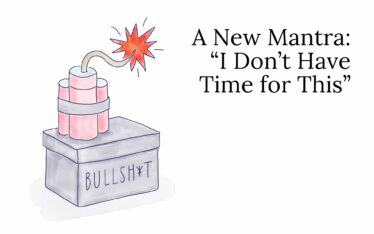I’ve been talking a lot about adding more vitality to our lives lately—which is a pretty fantastic thing to do as we approach the unfathomable end of the Netflix menu (because THANKS, COVID, WE’VE WATCHED EVERYTHING by now, even Hot Tub Time Machine)—but lest you find out start to think I’m shallow, I figured it’s high time I talk about meaning.
Meaning?
The thing that gives us depth in our lives, the thing that augments the hedonic-pleasure-zest-filled lives we’ve been clamoring for since Covid took our toys away?
“Meaning provides us with the sense that our lives matter, that they make sense, and that they are more than the sum of our seconds, days, and years” – Steger.
Okay, so I’m super literal—so when I look at this great quote, by Michael Steger, one of the experts on our planet on meaning—I read that meaning is something greater than the sum of our parts. Meaning is about something bigger than ourselves, whatever that might be (whoever we might be).
So how do we get ourselves more meaning? It’s admittedly easier to stuff our lives full of vitality (any pleasurable experience will do—and for now I’ll pick a flute of something pink and bubbly), so we might need some help figuring this out. Don’t worry. I’ve cherry-picked my favorite 10 things to max out the meaning. The list is long, but don’t expect meaning to seep into you in a wee little listicle. Meaning takes work, so read on, soldier.
10 things meaning-full people do (and therefore so might we):
- These people are in touch with their impact. People who find the most meaning in their lives tend to understand the impact of their work, or whatever it is they are doing—so for example, working as an executive assistant, or speaking at a community rally, or helping a friend through her divorce—understanding why they’re showing up doing what they’re doing—that helps them connect with a bigger purpose and find satisfaction in what they’re up to.
- Self-awareness. People who really know themselves—their true selves, who they really authentically are, what they value, what their strengths are, what they are really talented at and scared of and capable of— these people feel life is more meaningful. (This article will start to sort out your values, FYI.)
- Having a giving mindset. By putting aside our own selfish interests to serve someone or something bigger than ourselves, it’s no surprise we make meaning out of that. Volunteers consistently state they have more meaning and purpose in their lives than those who don’t volunteer. People who see their jobs as meaningful happen to view their jobs as a way to help others. There is such a thing as a “helper’s high”, but it also goes deeper than that great hedonic feeling. Helping or giving connects us in some way to other humans, which greases the skids for meaning. Relationships and well-being go hand in hand.
- Belonging. Americans are most likely to mention family when describing what provides them with a sense of meaning. Why is that? The sense of belonging that people feel from a family member, or from a close personal relationship, leads to feeling valued, and basically the opposite of loneliness (which is a massive epidemic in our society by the way—loneliness kills. We’ll cover that some other time.). High quality connections reassure us that we belong, that someone cares if we show up for dinner, if we’re alive or dead. Meaning is not something we make in a vacuum, like in our condo all alone. Meaning largely exists because of other people.
- Having spiritual ties. Studies show again and again that people who attend weekly religious services, regardless of the denomination, strongly agree their life has meaning… 67% in one study, compared to 36% of people who never attend religious services. But let’s not think that atheists don’t find meaning—they just find proportionally more of it in finances, activities and hobbies.
- People with a lot of meaning in life experience meaning at the expense of happiness. Some of the things we do that are meaningful don’t necessarily make us happy. Sometimes they put a bona fide dent in our happiness, but because we’re invested in something beyond ourselves, we self-sacrifice for the good of the cause. Parenting and looking after elderly parents are two great examples. One of my clients looked after her aging Mom for a year before she passed away, and she says while it was the most exhausting challenge of her life, it also made her life feel 100 times more meaningful. Another client was a prosecutor for family crimes, which could never ever be described as a fun job—but her life was rich with meaning.
- Reflective. They say that people who are engaged in the present moment are happier—even if the present moment is a kind of crappy one. But being present in the moment might not yield a ton of meaning. In contrast, people who are reflective about what’s ahead, or about what happened in the past—maybe hard times they overcame—those people tend to feel more meaning in their lives. It’s true they aren’t always as happy, because reflection isn’t always easy, but the experiences of looking into the past or considering the future can be poignant and meaningful.
- Suffering, discomfort and loss. This one is tough but true. It can relate to the growing pains we feel when we are learning or developing in pursuit of being better versions of ourselves—like the weekends and evenings spent working on a graduate degree, when you could be out hedonically enjoying all the weekend brunches that life has to offer instead. People with high meaning in their lives have typically undergone some sort of struggle—a suffering like an illness, bankruptcy, or a loss maybe of a loved one—that has rocked their world and caused them to put the pieces back together again, Humpty Dumpty styles. Meaning appears to be a part of this process. Remember when we spoke about people who had brushes with death, how they emerged with this new lease on life? Think of any struggles you’ve had in your life. When you look past the rubble of the issue or hardship, was meaning created in those ashes? Even people who have experienced trauma can experience post-traumatic growth, a phenomenon where some people rise to a higher level of functioning as a result of changes that occur in a major life crisis.
- Finding that “challenge zone” leads to meaning. Meaning-filled people tend to solve a lot of problems, and then feel really good about doing that. It could be taking on the task of replacing the windows in your home, like one of my clients is excited to figure out. Another gal says she loves solving the problems that no one else wants in her office. (Wow—don’t we all want more of her in our world?) Even solving a puzzle, which you might have said belonged in the vitality camp because it’s all fun and games—but no! It straddles the line. Working on a challenging game can feel really great when you’ve solved it (especially when your cat doesn’t mess up all the carefully-laid pieces). We’ve already talked about flow, that special zone of losing yourself in any activity that’s not too beyond your skillset to make you feel like a failure, and just challenging enough to not make you feel like you were thrown a total softball. People with a lot of meaning in their life live here, a lot. They’re growing and challenged and avoiding boredom and anxiety because of that sweet spot that delivers meaning.
- And finally, generativity. This is a self-transcendent aspect of meaning—and it has been shown to be the most powerful predictor of meaningfulness of all. People who are inspired to create and do things that will endure beyond their death, like mentoring kids or donating money to a local hospital that will serve others for generations to come—these people soak themselves in meaning. Generativity is the gift that keeps on giving for those who give the gift, and those who benefit from the trees planted, or the endowment, or whatever. Doesn’t this make you wonder how you can do something generative in your own life?
If you’re still with me after this long list, chances are you’ve already found a way to deepen your life even further. No need to do all 10… maybe just one small thing that can give you the “sense that your life matters, that it makes sense, and that you are more than the sum of your seconds, days, and years”. Because it does.







